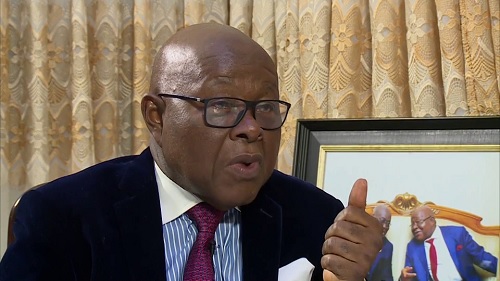Former Speaker of Parliament, Professor Aaron Mike Oquaye, has stated that the exorbitant fee being demanded from the intended flagbearers of the New Patriotic Party (NPP) is a suicidal pathway and must be avoided.
A stalwart of the party, he said the election was not an auction and the political party could not be for sale.
Describing the NPP’s demand of GH¢4 million from aspiring flag bearers as a development fee as “a bubonic plague,” Prof. Oquaye stressed that “Moneycracy is not democracy, and a political party must not be seen to be pursuing that pathway.”
He was speaking in an interview with the Daily Graphic following the introduction of the development fee of GH¢4 million, which the party explained was supposed to be used to help develop the structures of the party.
Per documents made available by the NPP, the party has asked each aspirant to pay GH¢100,000 for nomination forms, GH¢500,000 for filing, and an additional GH¢4 million as a “development fee.”
Some speculate that the new fee may be used to disqualify some presidential aspirants, favouring only those with deep pockets.
Unreasonable demand
In the view of the former Speaker, the exorbitant fee being demanded by the NPP was “unreasonable” and could negatively impact the party and democratic development of the nation.
Prof. Oquaye, who led a 12-member committee earlier this year to investigate the NPP’s defeat in the 2024 general election, said the party should not forget that the development had become a “public issue” and concern for every Ghanaian, saying under the 1992 Constitution of Ghana, political parties, in their internal management and activities, must abide by democratic principles.
He explained that the Constitution also prohibited any discrimination against anyone in public affairs.
Prof. Oquaye cited Article 17(1e 2) which says that “All persons shall be equal before the law. (1) A person shall not be discriminated against on grounds of gender, race, colour, origin, creed, or social or economic status.”
He also quoted Article 55 (5), which stipulates that “The internal organisation of a political party shall conform to democratic principles, and its actions and purposes shall not contravene or be inconsistent with this constitution or any other law.”
Throwing light on past financing of the NPP, Prof. Oquaye said the history and tradition of the party showed that its mother party—the United Gold Coast Convention—was launched in 1974 at Saltpond with a ‘Foundation Fund’ to which those who participated in the formation contributed.
He recalled that the leaders were elected without reference to the monetary contributions.
Making reference to himself as a former Greater Accra Regional Secretary of the party in 1992, Prof. Oquaye said he saw how moneys were voluntarily raised through donations and fundraising events of various dimensions.
“Our first flag bearer—Prof. Albert Adu Boahen, whose national campaign team I was a part of—was not elected with any monetary consideration or qualification whatsoever.
“This has followed through reasonable nomination/filing fees over the years,” Prof. Oquaye stated.
The NPP’s elder said the party could not have an owner or a cabal of a few owners by dint of the money they owned or had acquired, stressing that the party must be strong by itself.
Otherwise, when a person was allowed to buy the party, that person would control it according to his own whims and caprices, he added.
“It will become a jingoistic malperformance of ‘he who pays the piper calls the tune.’
This will undermine a conceptualisation I have advocated for the NPP and Ghanaian politics generally—‘Party in Partnership with Government,’” he said.
Citing the commonest complaints of NPP party officeholders and the rank and file, Prof. Oquaye decried how the party was set aside after elections, and the few in government ran the show in the interest of a few.
“The NDC spoke of ‘Family and Friends of the President,’ and the NPP has complained the same! We all know what I am talking about.”
“There is a need to give the party reasonable and considerable autonomy and not drive it into the hands of deep-pocketed men and women,” he said.
Prof. Oquaye, therefore, urged the National Executive Committee (NEC) of the party and the NPP in general to revisit fundraising strategies that detached money-raising on the whole from the candidacy for political office.
He stated that political party business was done by raising money from the multitude and, therefore, urged the party to raise money at once by appealing to the elders of the party, trustees, patrons, and the totality of the membership.
Advising against any one person owning any political party in Ghana, the former Speaker of Parliament urged political parties to work to maintain their purity in Ghana.
“It is not any money that can be accepted, even if offered. Due diligence is important to ensure sanity and sanctity in the body politic.”
“We saw a man from abroad who came and bought his way to Parliament and disgraced us when he was arrested, tried, and jailed in the USA for cocaine,” he said.
Breeding corruption
The former Speaker pointed out that one of the main challenges militating against good governance in Ghana was corruption.
He cited how the creeping “moneycracy” in Ghana’s internal party democracy and national political contest at both the parliamentary and presidential levels had been researched by think tanks such as the Institute of Economic Affairs, the Centre for Democratic Development, Ghana (CDD-Ghana), the Institute for Democratic Governance (IDEG) and others.
Those think tanks, he said, had developed strategies to abate the phenomenon rather than fan the flames, which would consume “purity and honesty in our political party systems.”
“It is a truism that political party financing plays a cardinal role today in breeding corruption in the governance and political systems.
“The consequences are dire, and the future is gloomy.
It cannot be further condoned.” Prof. Oquaye stressed
Source: Graphic.com.gh
ALSO READ:



